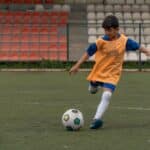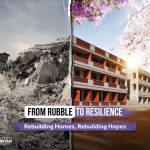In the tumultuous midst of global crises and conflicts, an alarming number of families are thrust into the harsh reality of displacement, becoming refugees.
This growing crisis demands immediate attention, particularly in addressing the unique challenges faced by displaced children, whose well-being and development are significantly impacted.
In this article, we delve into the urgent need for effective support and education for these vulnerable young minds.
The challenges facing refugee children
Refugee children face several unique challenges that can significantly impact their well-being and development:
Mental Health Risks
Their bodies are constantly bombarded by visceral warning signs, and in an attempt to control these processes, they often become experts at ignoring their gut feelings and in numbing awareness of what is played out inside. They learn to hide from themselves.
– Bessel van der Kolk, “The Body Keeps the Score”
Refugee children, having endured the hardships of displacement, are confronted with profound mental health challenges. The traumas they experience during forced migration elevate the risk of various mental health issues:
Post-Traumatic Stress Disorder (PTSD)
Refugee children are particularly susceptible to PTSD, a severe mental health condition arising from exposure to traumatic events. The upheavals of fleeing conflict zones or persecution often imprint lasting psychological scars.
Anxiety
The uncertainties and upheavals associated with displacement contribute to heightened levels of anxiety among refugee children. The loss of stability, separation from familiar environments, and the unknown future can trigger persistent anxiety in these vulnerable children.
Depression
Prolonged exposure to distressing circumstances and the disruption of normal life can lead to depression in refugee children. The absence of a secure and nurturing environment, coupled with the challenges of adaptation, increases the risk of depression.
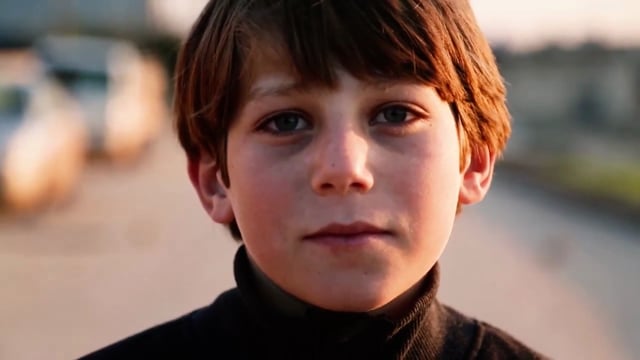
Exposure to Violence and Exploitation
Children in refugee situations confront a myriad of challenges, with exposure to violence and exploitation being a primary concern. These vulnerable children face significant risks due to the following factors:
Violence and Abuse
Refugee children, already enduring the trauma of displacement, are frequently exposed to violence and abuse due to the pressures of being in a new area. The upheaval of fleeing their homes and the harsh conditions of life as refugees make them susceptible to physical harm and emotional trauma.
Neglect and Lack of Protection
The chaotic nature of refugee crises often results in the neglect of children’s basic needs and a lack of adequate protection mechanisms. The guardians are often absent trying to provide for the children, and this neglect further compounds their vulnerability, leaving them without essential resources and safeguards.
Exploitation and Trafficking
Refugee children are at an increased risk of exploitation and trafficking. The absence of stable environments and protective structures makes them targets for those seeking to exploit their vulnerability, subjecting them to various forms of exploitation and trafficking within their new environment.
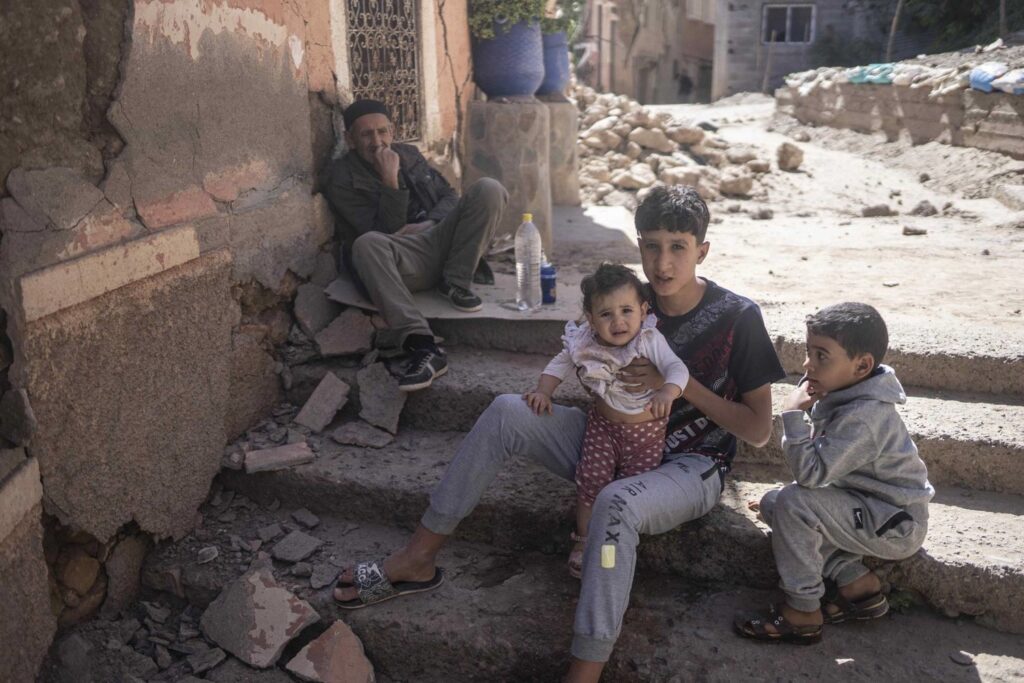
Educational Barriers
Refugee children encounter significant obstacles in accessing education, stemming from the complex interplay of emotional trauma, conflict-related challenges, lack of supervision, and limited access to essential educational resources.
Emotional Toll of Conflict and Trauma
The emotional toll of conflict and displacement creates a profound barrier to education for refugee children. Traumatic experiences may result in psychological distress, making it difficult for them to focus and engage in learning activities.
Disruption of Normal Learning Environments
The upheaval caused by conflict often leads to the disruption of normal learning environments. Schools may be damaged or inaccessible, forcing children to adapt to makeshift or non-conducive educational settings that hinder effective learning, such as classrooms that lack heating in winter.
Limited Access to Educational Resources
Refugee children frequently face challenges in accessing fundamental educational resources. This includes textbooks, learning materials, and a conducive learning environment. Insufficient resources impede their ability to receive a quality education.
Inadequate Infrastructure and Transportation
Insufficient infrastructure and transportation facilities exacerbate educational barriers. Many refugee children may not have access to schools due to poor physical conditions, lack of transportation, or long distances to educational institutions.
Multigrade Classes and Understaffing
The education of refugee children is further hindered by the prevalence of multigrade classes and understaffing. These conditions impact the quality of education, making it challenging for teachers to address the diverse needs of students.
Poverty and Compelled Labor
Economic hardships often force refugee children into compelled labor, diverting their attention and time away from education. Poverty exacerbates the struggle to meet basic needs, further limiting their ability to attend school regularly.
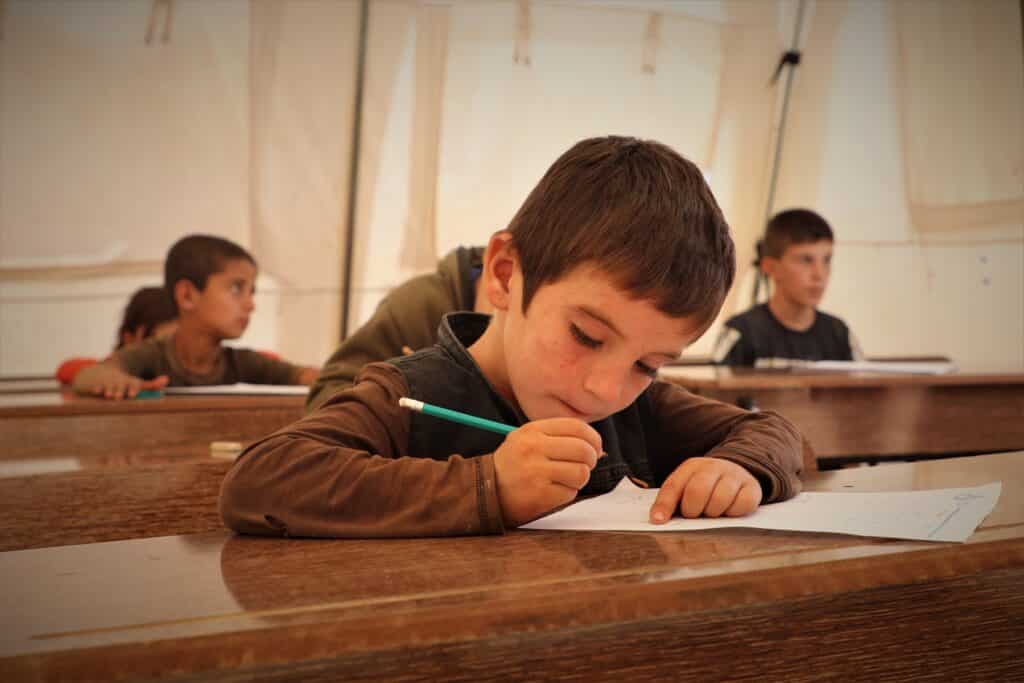
Settlement Challenges
Refugee children confront a multitude of challenges during the settlement process, encompassing various facets of their lives and well-being.
Affordable Housing Struggles
Securing affordable housing proves to be a significant hurdle for refugee families, directly impacting children. Limited financial resources often lead to overcrowded living conditions, substandard housing, and increased vulnerability to health issues.
Employment Barriers
Refugee children’s families often face obstacles in finding stable employment opportunities. Economic instability and unfamiliarity with local job markets contribute to difficulties in securing sustainable income, affecting the overall well-being and educational prospects of these children.
Language and Communication Challenges
Adapting to a new language and communication environment poses inherent difficulties. Language barriers hinder effective integration into schools and communities, potentially impeding academic progress and social inclusion for refugee children.
Racism and Discrimination
The settlement process may expose refugee children to racism and discrimination in their new communities. Prejudice and bias, fueled by cultural differences and misinformation, can adversely affect the mental health and social integration of these children.
Cultural Adjustment Strain
Navigating a new cultural landscape poses challenges for refugee children. Adapting to different customs, traditions, and societal norms can be overwhelming, leading to feelings of isolation and identity confusion.
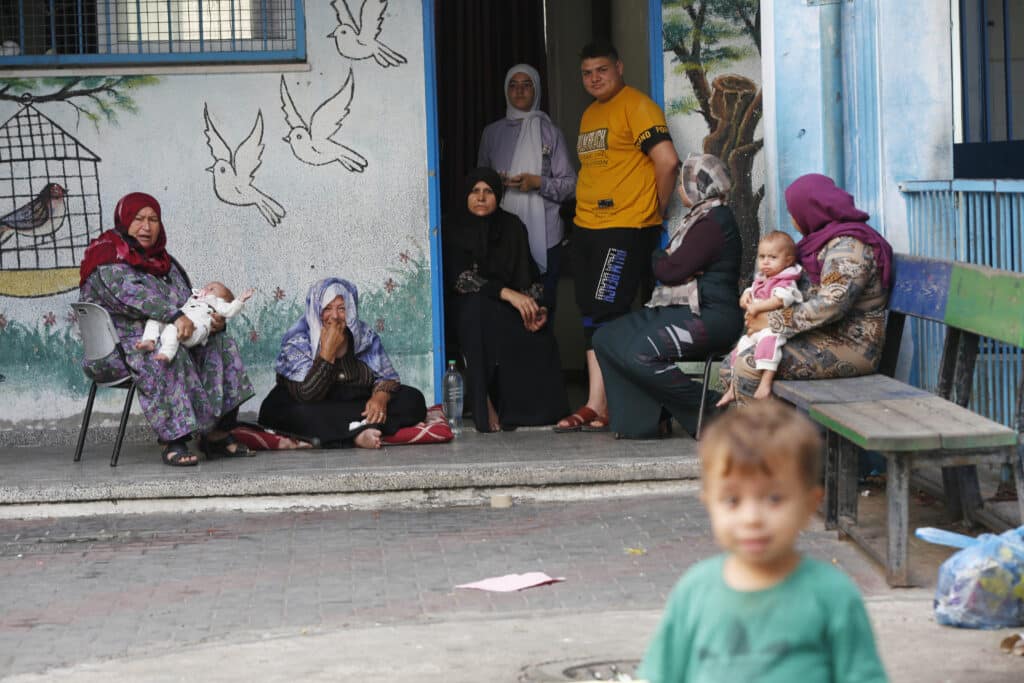
Basic Needs Deprivation
Basic needs deprivation among refugee children constitutes a grave humanitarian crisis, with profound consequences on their well-being, development, and future prospects.
Poverty Struggles
Refugee children frequently find themselves living below the poverty line, facing economic instability and a lack of resources and sustenance. Poverty aggravates their vulnerability, hindering access to education, healthcare, and other essential services.
Substandard Living Conditions
The living conditions of many refugee children are marked by overcrowding, inadequate shelter, and insufficient sanitation. These substandard conditions are all too common in the Refugee Camps and contribute to health risks, compromise privacy, and undermine the overall quality of life.
Limited Access to Safe Drinking Water
Ensuring access to safe drinking water is a critical challenge for many refugee communities. Inadequate sanitation infrastructure and the absence of clean water sources expose children to waterborne diseases, compromising their health and well-being.
Healthcare Disparities
Deprivation of adequate healthcare is a pervasive issue among refugee children. Limited access to medical facilities, vaccinations, and essential treatments leaves them susceptible to preventable illnesses and worsens existing health conditions.
Food Insecurity
Insufficient access to nutritious food is a common challenge. Malnutrition and food insecurity are prevalent among refugee children, affecting their physical and cognitive development and predisposing them to a range of health issues.
Forced Labor as a Consequence
The dire circumstances of basic needs deprivation often push refugee children into forced labor. Economic desperation, lack of educational opportunities, and exploitation by unscrupulous employers compel children to work in hazardous conditions, robbing them of their childhood for meager pay.
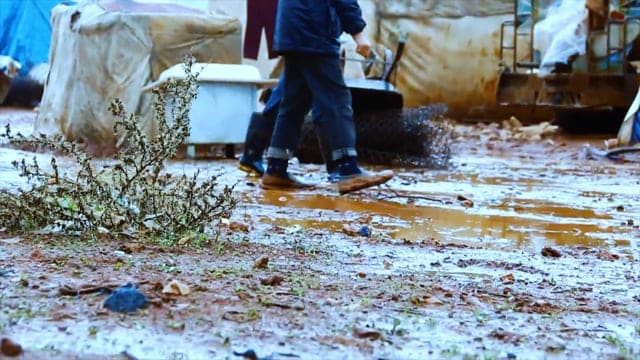
How to support and empower refugee children
Numerous challenges encountered by refugee children necessitate a multifaceted approach for their support and empowerment to be provided. By integrating the strategies outlined below, a holistic and effective response is ensured:
Access to Quality Education
Access to quality education is ensured by establishing safe and inclusive learning environments, providing trained teachers, and supplying appropriate educational resources.
Essential for establishing schools in refugee camps and host communities are collaborative efforts between humanitarian organizations, governments, and local communities.
Psychosocial Support for Mental Well-being
The mental well-being of refugee children is prioritized through comprehensive psychosocial support. Counseling services, trauma-informed care, and recreational activities that promote healing, resilience, and fun are included in this support.
A supportive environment is created by engaging community members, including cultural mediators and mental health professionals.
Language and Integration Support
Language barriers hindering integration are addressed by offering language classes and support services. The integration of refugee children into the education system and broader community is enhanced by facilitating the learning of the local language.
Effective communication during crucial interactions is ensured by language support, including interpretation services.
Community Engagement and Empowerment
A sense of belonging and empowerment is fostered through community engagement. Participation, leadership development, and cultural exchange among refugee children and their families are encouraged by establishing parent-teacher associations, youth groups, and community events.
Legal Protection and Advocacy
The legal protection of refugee children is ensured to prevent exploitation, violence, and trafficking. Policies and legal frameworks safeguarding their rights, including access to education, healthcare, and protection from discrimination, are developed and enforced.
Awareness about their specific needs is raised, and support for their rights is mobilized through advocacy efforts.
Partnerships and Collaboration
Effective support is facilitated through collaboration among stakeholders, including governments, NGOs, civil society organizations, and local communities.
Holistic and sustainable solutions are ensured with the sharing of resources, expertise, and best practices, maximizing the impact of interventions.
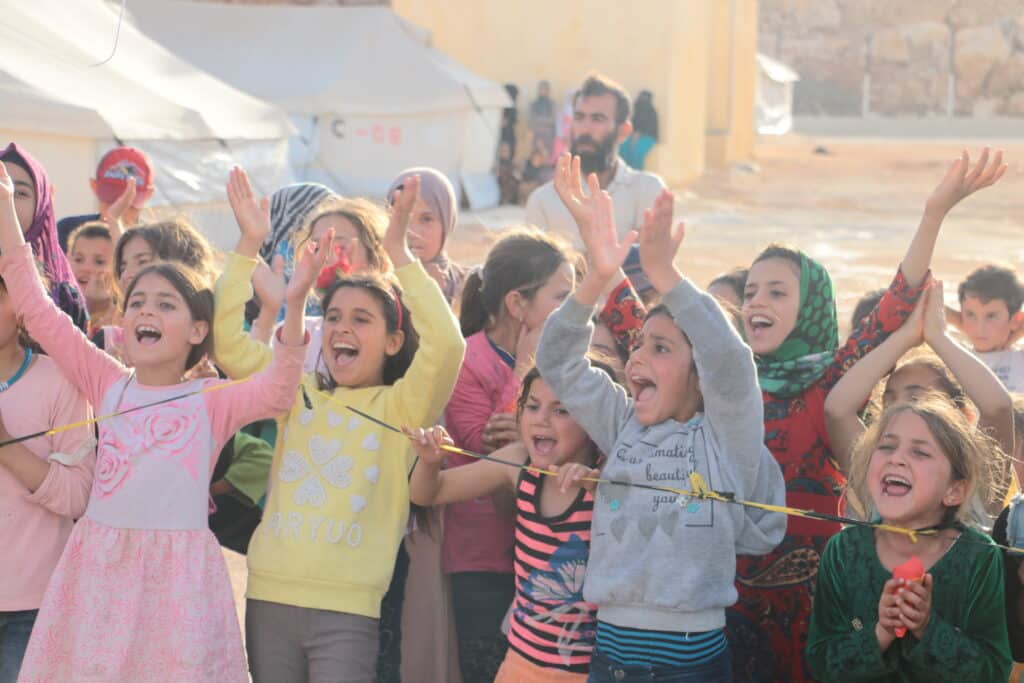
Bonyan Organization’s efforts to support refugee children
Bonyan Organization is deeply committed to supporting the well-being and development of refugee children in conflict-affected regions. Their focused efforts encompass two main areas:
Education Program: Nurturing Minds
- Safe Learning Spaces: Establishing secure environments for education.
- Quality Education: Enhancing learning through formal and non-formal methods, including teacher training.
- Inclusivity: Ensuring education for all, including children with disabilities.
- Community Engagement: Involving caregivers and communities in educational initiatives.
Protection and Sponsorship Program: Ensuring Safety
- Psychosocial Support: Aiding psychological recovery and mental health.
- Awareness Programs: Educating on GBV, PSEA, COVID-19, hygiene, and legal rights.
- Emergency Assistance: Providing support during crises.
Through these initiatives, Bonyan Organization strives to create a brighter, more secure future for refugee children, emphasizing the importance of education and protection in their journey towards empowerment and resilience.
Donate to help refugee children
Join Bonyan Organization in their noble cause. Your donation can help provide essential education and protection services to refugee children, giving them hope and opportunities for a better future. Every contribution, big or small, makes a significant impact. Donate now and be a part of this transformative journey.
FAQs
What Challenges Do a Child Refugee Face?
1- Sexual harassment.
2- Child labor.
3- Child abuse marriage.
4- Educational hardships and bullying.
5- Weak integration.
6- Lack of interaction.
What are the unique needs of refugee students?
Addressing the unique needs of refugee students involves a comprehensive approach that encompasses trauma and mental health support, language and academic assistance, and fostering a culturally sensitive and inclusive environment.
Educators can enhance the integration of these children by adopting culturally responsive teaching, facilitating peer support systems, engaging with the community, and undergoing professional development focused on the needs of refugee students.
Are there specific actions recommended for supporting refugee children?
To support refugee children effectively, it’s important to implement educational programs tailored to their specific needs, provide access to psychological services, engage with their families, and advocate for policies that protect and promote their rights.
What can individuals do to help in the child refugee crisis?
Individuals can contribute to this cause by volunteering with organizations that support refugees, donating to relevant charities, raising awareness about the challenges faced by refugee children, and participating in cultural exchange initiatives.
Content
- The challenges facing refugee children




